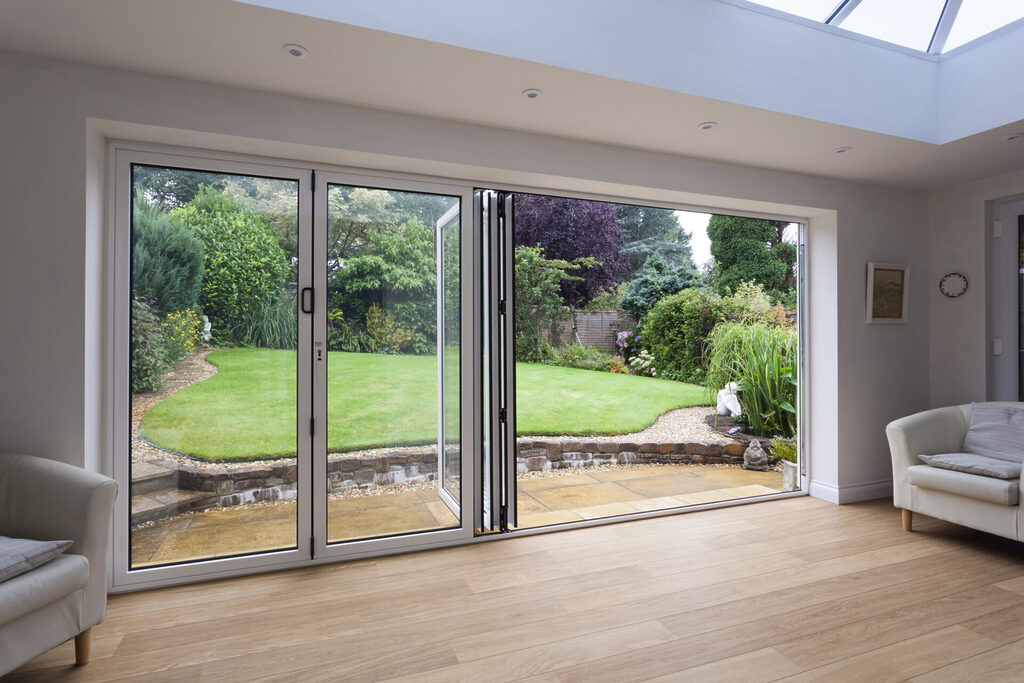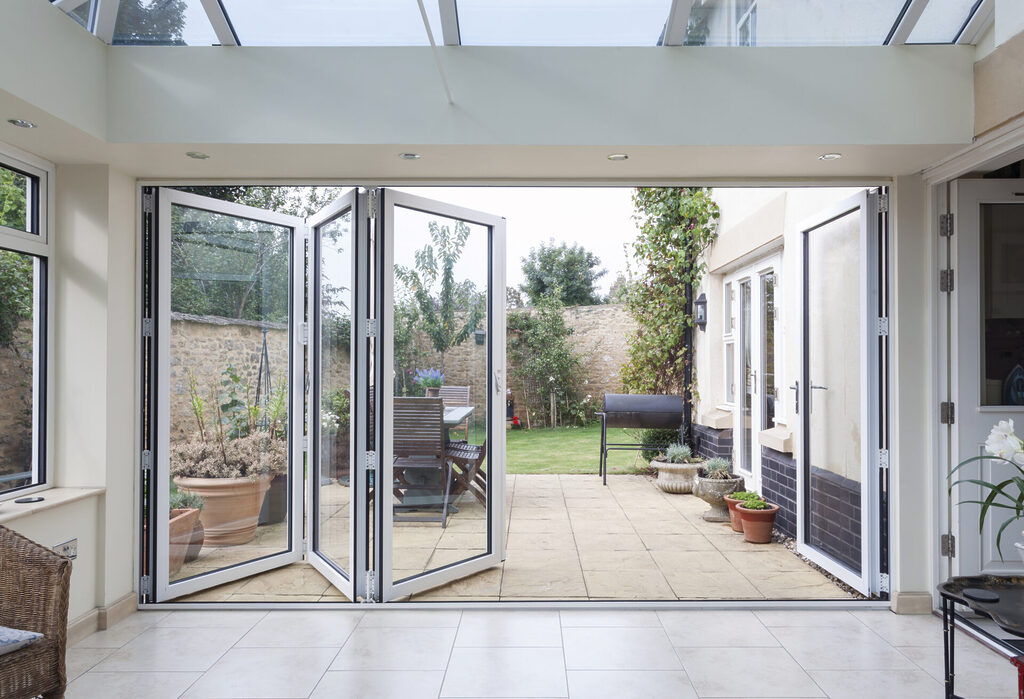Last Updated on 29 November 2024 by Tia Ellahi
What are Better, uPVC Bifold Doors or Aluminium Bifold Doors?
When it comes to choosing between uPVC and aluminium bifold doors, aluminium offers premium durability and sleek aesthetics, while uPVC provides a budget-friendly, low-maintenance solution—making the best choice depends on your home’s needs and priorities.
At GFD Homes, we know that choosing the right bifold doors is a big decision.
Not only are bifold doors a functional way to connect your indoor and outdoor spaces, but they can also transform your home by maximising natural light, improving energy efficiency, and boosting your property’s value.
When it comes to materials, aluminium and uPVC are two of the most popular options. But which is right for you?
It depends on your priorities—whether it’s durability, cost, aesthetics, or environmental impact.
This guide will walk you through the pros and cons of aluminium vs uPVC bifold doors, helping you make an informed choice for your home.
Looking for something specific? Jump right to it:
Aluminium and uPVC Bifold Door Frames Explained
The key difference between aluminium and uPVC bifold doors lies in the material used for the frame. Here’s a quick overview:
Aluminium bifold doors – Sleek, strong, and durable, aluminium frames are ideal for supporting large glass panels.
They’re trendy in modern homes for their slimline look and premium feel.
uPVC bifold doors – Lightweight and affordable, uPVC frames are a practical choice for homeowners on a budget. They come in a range of finishes, including options that mimic wood, making them versatile enough for various home styles.
However, one limitation is that uPVC bifold doors aren’t as strong as aluminium, so they can’t support large glass panels in the same way.

Aluminium Bifold Doors vs uPVC: What To Consider
Choosing between aluminium and uPVC isn’t just about price — it’s about finding the best fit for your home’s needs. Here’s a breakdown of the most important factors:
Durability and Longevity
When it comes to durability, aluminium leads the way.
This material is incredibly strong, resistant to rust, and unaffected by temperature changes or moisture.
Even after years of exposure to the elements, aluminium bifold doors retain their sleek appearance.
While uPVC is durable it simply doesn’t have the same longevity as aluminium.
Over time, exposure to UV rays can cause uPVC to fade or warp and become brittle over time, especially in areas with strong sunlight.
While uPVC can perform well in moderate climates, it likely will need replacing far sooner than aluminium.
Cost
Cost is often a deciding factor for homeowners when it comes to home improvements, and uPVC bifold doors are the more budget-friendly option.
They’re cheaper to manufacture and install, making them ideal for those looking to improve their home with a tighter budget.
However, aluminium bifold doors, while more expensive initially, are considered a much better long-term investment.
Their superior durability means you’re less likely to have to splash out on repairs or replacements, saving you money in the long run.
If you’re planning to stay in your home for many years, consider aluminium for its lasting value.
For a deeper dive into pricing, check out our guide to bifold door cost.
Strength and Security
When it comes to bifold door security, this is an area where aluminium truly shines.
Thanks to its inherent strength, aluminium frames are tough to break, even with minimal bulk.
This allows for slimmer profiles without compromising safety. Paired with multi-point locking systems and different glazing options, aluminium bifold doors offer exceptional protection.
uPVC doors, while secure, are less robust than aluminium.
The material’s lighter construction can make it more susceptible to forced entry.
What’s a multi-point locking system? This advanced feature secures the door at multiple points along the frame, making it far harder for intruders to break in. Both aluminium and uPVC doors often come with this system, but aluminium’s strength adds an extra layer of security.
Cleaning and Maintenance
If low maintenance is a priority, both materials score well.
uPVC doors require minimal effort to keep clean—a quick wipe with soapy water is often enough to remove dirt and grime.
Aluminium frames are equally easy to maintain but may need occasional cleaning to prevent dirt from accumulating in their slim profiles and causing any functional issues.
By cleaning your bifold doors every few months you will keep your bifold doors looking and working at their best, regardless of the material.
Energy Efficiency
Both aluminium and uPVC bifold doors can be highly energy-efficient when paired with double or triple glazing.
Modern aluminium doors feature thermal breaks — insulating barriers within the frame that prevent heat transfer. This innovation puts aluminium on par with uPVC in terms of thermal performance.
Why it matters: Energy-efficient doors can reduce your heating bills and lower your carbon footprint, making them a smart choice for eco-conscious homeowners.

For more tips on energy savings, check out the benefits of aluminium doors.
Customisation Options
If you’re looking for variety, aluminium takes the crown.
With a wide range of colours, finishes, and frame styles, aluminium bifold doors can be tailored to suit any home.
Whether you’re after a bold, modern look or a subtle, classic design, aluminium offers endless possibilities.
uPVC doors, while versatile, don’t provide the same level of customisation.
Aesthetic Appeal
Aluminium bifold doors are the go-to choice for creating a sleek, contemporary aesthetic.
Their slim frames and large glass panels give your home a modern edge, maximising natural light and creating seamless indoor-outdoor transitions.
uPVC bifold doors, while functional and attractive, lack the premium look that aluminium offers.

Imagine entertaining guests with your bifold doors fully open, framing your garden like a living masterpiece. Aluminium frames make that vision a reality.
Environmental Impacts
Aluminium is one of the most sustainable building materials. As it’s fully recyclable, old frames can be repurposed without waste.
While uPVC can be more cost-effective, it is less eco-friendly to produce and dispose of.
If sustainability is a priority for you, then aluminium is the clear winner.
Should You Choose Aluminium or uPVC Bifold Doors?
Ultimately, the choice comes down to your needs:
If you’re looking for a budget-friendly, low-maintenance solution then uPVC bifold doors might take your fancy.
But if you’re after long-term durability and value, customisation, and a premium look, then aluminium bifold doors are the ones for you.
Find Secure, Durable, and Smart Aluminium Bifold Doors with GFD Homes
At GFD Homes, we specialise in a range of aluminium bifold doors including the popular smart aluminium bi-folding doors that combine cutting-edge technology with unbeatable durability and style.
Whether you’re upgrading your home or starting fresh, our expert team is here to guide you every step of the way.
If you’re ready to take a dive into the home improvement pool you can call our expert team on 01642 309 576 or contact us online to discuss how they could transform your space!
Feeling a little overwhelmed? Why not take a little step back and read our article on ‘what is a bifold door‘ first.
FAQs about Aluminium Bifold Doors vs uPVC
Are aluminium bifold doors better than uPVC?
Yes, some of the benefits of bifold doors made from aluminium include better durability, security, and aesthetics. However, uPVC may be the more affordable option.
Are aluminium bifold doors cold?
Not at all! Modern aluminium bifold doors feature thermal breaks that have significantly improved their energy-efficiency and the reputation that older models have left them with!
How secure are aluminium bifold doors?
Aluminium bifold doors are extremely secure, thanks to their robust frames and advanced locking systems.
Is aluminium more expensive than uPVC?
Yes, aluminium is more expensive upfront, but its long-term durability and premium finish offer excellent value for money.
